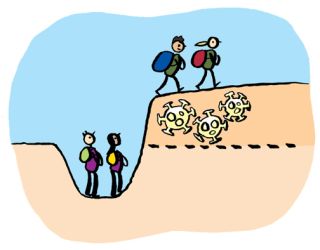Covid-19 induced school closures could reverse progress on educational disadvantage

Covid-19 induced school closures could reverse much of the progress made addressing educational disadvantage. It will widen the learning gap between rich and poor, impose long-term losses of income on all students - with disadvantaged students suffering greater learning losses and greater impacts on their lifetime earnings. This is one of the main findings of the ‘Social Justice Matters Policy Brief: Education and Covid-19’.
The findings regarding the economic impact of interrupted learning and education on individual student’s earnings throughout their lifetime are very concerning with long-term losses in income of around 3 per cent. The impact on national GDP is equally concerning with the optimistic scenario being a loss of 1.5 per cent GDP throughout the remainder of the century, with this loss expected to be even greater if education systems are slow to return to prior levels of performance. This annual loss of GDP is as a result of lower incomes, lower tax revenues, lower skill levels and productivity and a higher reliance on social protection systems as a result of the impact of Covid-19 on education systems.
Main findings of report:
- The impact of Covid-19 induced school closures and resultant learning losses will follow students into the labour market. These students face long-term losses in income and an average student can expect around 3 per cent lower earnings throughout their lifetime as a result of the interruption to their education
- Disadvantaged students will suffer greater learning losses and greater impacts on their lifetime earnings. Much of the progress made addressing educational disadvantage to date will be reversed unless the appropriate policies and investment are put in place.
- The optimistic scenario for the educational impact of Covid-19 on national economies is a loss of 1.5 per cent GDP throughout the remainder of the century, with this loss expected to be even greater if education systems are slow to return to prior levels of performance.
- Covid-19 and extended school closures has had a devastating, and likely lasting, impact on children with special educational needs and their families. Notwithstanding the increases in investment in Special Needs Education in recent Budgets, clearly much more remains to be done in order to support these children and their families in the education system.
- More than four in ten students in Ireland reported a major or moderate negative impact on their learning as a result of Covid-19 induced school closures and over fifty per cent of students reported that they did not learn enough during school closures.
- Educational level attained is one of the most important individual factors in reducing the risk of poverty for adults and, as this educational level seems to be linked across generations, it is important for reducing child and household poverty. Addressing educational disadvantage and investing sufficient resources into policies that work must be a Government priority.
Policy Priorities for consideration
- Keep average class sizes below 20, reduce the pupil teacher ratio further and ensure all DEIS Band 1 and 2 schools have sufficient resources to implement strategies to improve literacy and numeracy outcomes for pupils.
- Make the improvement of educational outcomes for pupils from disadvantaged backgrounds and disadvantaged communities a policy priority, with additional resources focused on addressing the persistence of educational disadvantage.
- Invest in reducing class sizes and pupil teacher ratios at primary and post primary level.
- Use the Department of Education projections in terms of enrolment and staff numbers to inform investment, plan for reducing class sizes, reducing pupil teacher ratios (a persistent problem which Covid-19 has highlighted), and ensuring that our education system has all of the resources that it requires to meet our national ambitions.
- Support schools to ensure that they have the required number of staff with appropriate qualifications, and the necessary programmes, supports and resources to meet the needs of pupils with special educational needs.
Much of the progress made addressing educational disadvantage to date will be reversed unless the appropriate policies and investment are put in place. Policy makers must give serious consideration as to how the lost learning of students at all levels of education will be made up in the coming months and years.